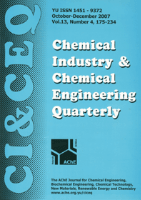
Chemical Industry & Chemical Engineering Quarterly
Scope & Guideline
Bridging Theory and Practice in Chemical Engineering.
Introduction
Aims and Scopes
- Chemical Process Engineering:
Research on the design, optimization, and simulation of chemical processes, including thermodynamic modeling and reaction kinetics to enhance efficiency and sustainability. - Material Science and Engineering:
Studies focused on the development and characterization of new materials, including nanomaterials and biopolymers, with applications in various industrial processes. - Environmental Engineering and Sustainability:
Investigations into methods for pollution control, waste management, and the development of eco-friendly processes that minimize environmental impact. - Renewable Energy and Resource Management:
Research dedicated to the conversion of biomass, waste materials, and renewable resources into energy or value-added products, emphasizing sustainability. - Biochemical Engineering:
Explorations of bioprocesses and biotechnology applications, including microbial fermentation and enzymatic processes for the production of biofuels and biochemicals. - Advanced Analytical Techniques:
Development and application of novel analytical methods and technologies to characterize materials and monitor chemical processes.
Trending and Emerging
- Sustainable and Green Chemistry:
There is a marked increase in research dedicated to sustainable practices, including the development of biodegradable materials and green chemical processes that reduce environmental impact. - Nanotechnology and Advanced Materials:
The use of nanomaterials in various applications, including catalysis and biomedicine, is trending upwards, showcasing innovative approaches to material science. - Process Simulation and Modeling:
Enhanced computational methods for process simulation, including the use of artificial intelligence and machine learning, are emerging as key tools for optimizing chemical engineering processes. - Bioprocessing and Bioengineering Innovations:
Research on bioprocessing techniques, including the production of biofuels and biochemicals from renewable resources, is gaining prominence as industries seek sustainable alternatives. - Waste Valorization and Circular Economy:
Increasing focus on recycling and converting waste materials into valuable products signifies a shift toward a circular economy model in the chemical industry.
Declining or Waning
- Traditional Chemical Manufacturing Processes:
Research focusing on conventional chemical processes without incorporating modern technologies or sustainability aspects is becoming less prevalent, as the industry shifts toward greener methodologies. - Inorganic Chemistry and Traditional Catalysis:
There is a noticeable decline in papers centered on purely inorganic chemistry and traditional catalytic processes, as the focus moves toward more innovative and sustainable catalytic systems. - Basic Chemical Education and Theory:
Papers that primarily address foundational chemical education or theoretical aspects without practical applications are being published less frequently, indicating a shift towards applied research. - Static Experimental Studies:
Research that emphasizes static, non-dynamic experimental setups is declining, as there is a growing preference for studies that incorporate real-time data and dynamic modeling. - Chemical Safety and Risk Assessment:
While still important, the frequency of papers specifically dedicated to traditional safety protocols and risk assessments in chemical processes appears to be decreasing in favor of more integrated safety approaches.
Similar Journals

Chemical Engineering Journal Advances
Transforming Ideas into Impactful Research in Chemical Engineering.Chemical Engineering Journal Advances, published by Elsevier, is a premier open-access journal dedicated to advancing research and innovation in the field of chemical engineering. With its inception in 2020, the journal has quickly established itself as a key player in disseminating high-quality, peer-reviewed articles, boasting an impressive Q1 ranking in Chemical Engineering and related disciplines for 2023. The journal covers a broad spectrum of topics, including industrial processes, environmental chemistry, and innovative manufacturing techniques, making it essential reading for researchers and professionals aiming to stay at the forefront of chemical engineering advancements. With its commitment to open access, Chemical Engineering Journal Advances ensures that groundbreaking research is readily available to the global scientific community, fostering collaboration and knowledge exchange. Situated in the Netherlands, the journal supports its authors with a robust platform for impactful research dissemination, highlighted by a solid position in the Scopus ranks, indicating its influence and relevance in the field.
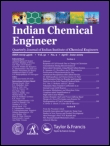
Indian Chemical Engineer
Advancing Chemical Engineering Knowledge.Indian Chemical Engineer, published by Taylor & Francis Ltd, stands as a reputable journal in the field of chemical engineering, encompassing a wide range of topics pertinent to both academia and industry. With an ISSN of 0019-4506 and an E-ISSN of 0975-007X, this journal has been a key resource for researchers and professionals since its inception in 1992, undergoing a significant evolution from 2009 to 2024. Currently ranked in the Q3 category of chemical engineering (miscellaneous) in 2023, it reflects a dedicated commitment to disseminating innovative research and insights within the discipline. The journal is indexed in Scopus, achieving a rank of 148 out of 273, which denotes its growing influence in the field with a 45th percentile placement. Although currently not an open-access publication, it offers valuable content that contributes extensively to the advancement of chemical engineering research and education. Researchers, professionals, and students alike are encouraged to engage with this publication to stay at the forefront of industry advancements and academic discussions.

CHEMIE INGENIEUR TECHNIK
Innovating Solutions for Tomorrow's Chemical Challenges.CHEMIE INGENIEUR TECHNIK, published by WILEY-V C H VERLAG GMBH, stands as a significant academic journal in the fields of Chemical Engineering, Chemistry, and Industrial and Manufacturing Engineering. With an ISSN of 0009-286X and an E-ISSN of 1522-2640, this esteemed journal has been contributing to the body of knowledge since 1949 and plans to continue its legacy until 2024. Notably, the journal holds a Q2 quartile ranking in 2023 across various categories, illustrating its recognized impact and relevance within the scientific community, with Scopus ranks indicating it falls within the top 60th to 51st percentiles of its respective fields. Although currently not open access, CHEMIE INGENIEUR TECHNIK provides readers with comprehensive insights into contemporary research, technological advancements, and practical applications, making it an essential resource for researchers, professionals, and students who are keen to stay abreast of developments in chemical processes and engineering advancements.
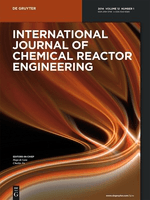
International Journal of Chemical Reactor Engineering
Exploring the Dynamics of Chemical ReactionsInternational Journal of Chemical Reactor Engineering, published by WALTER DE GRUYTER GMBH, serves as a vital platform for advancing knowledge in the field of chemical engineering, specifically focusing on reactor engineering. The journal, recognized by its ISSN 2194-5748 and E-ISSN 1542-6580, has maintained its commitment to quality research since its inception in 2002 and spans converged years through 2024. With a respectable Q3 ranking in the miscellaneous category of Chemical Engineering and a current Scopus rank of 158/273, it represents a significant resource for researchers aiming to publish innovative findings and practical applications. Although it operates under a subscription model, it still attracts attention for its rigorous standards and insightful contributions to the field. The journal’s focus on the interdisciplinary aspects of chemical reactor design, optimization, and safety underscores its importance in driving forward the technical and theoretical boundaries of chemical engineering. Addressed from Genthiner Strasse 13, D-10785 Berlin, Germany, the International Journal of Chemical Reactor Engineering is a must-read for professionals and scholars dedicated to pushing the frontiers of chemical reaction technologies.

Frontiers in Chemical Engineering
Empowering Research, Transforming EngineeringFrontiers in Chemical Engineering is an esteemed open-access journal published by Frontiers Media SA, dedicated to advancing knowledge in the dynamic field of chemical engineering. Since its inception in 2019, this journal has rapidly gained recognition for its rigorous peer-reviewed articles and innovative research contributions, achieving notable quartile rankings such as Q2 in Chemical Engineering and Q3 in both Bioengineering and Catalysis by 2023. With an emphasis on providing accessible and cutting-edge research, the journal caters to a diverse audience of researchers, professionals, and students interested in the latest developments and methodologies within the chemical engineering discipline. Hailing from Lausanne, Switzerland, Frontiers in Chemical Engineering embodies a commitment to enhancing collaborative scientific communication, making crucial research findings available without barrier. By publishing high-quality articles that address both theoretical advancements and practical applications in chemical engineering, this journal serves as a pivotal resource for fostering innovation and collaboration across the global research community.
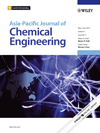
Asia-Pacific Journal of Chemical Engineering
Pioneering Sustainable Solutions for a Greener Tomorrow.The Asia-Pacific Journal of Chemical Engineering, published by WILEY, serves as a vital forum for the dissemination of innovative research in the interdisciplinary domains of chemical engineering, renewable energy, sustainability, and waste management. Established in 2006, this esteemed journal has achieved a notable impact factor that reflects its commitment to advancing knowledge and practices within the chemical engineering community. With its Q3 category rankings across various fields, including Chemical Engineering (Miscellaneous), Renewable Energy, Sustainability and the Environment, and Waste Management and Disposal, the journal holds a significant position among its peers, assuring readers of quality and relevance in published content. Although it does not offer Open Access options, the Asia-Pacific Journal of Chemical Engineering remains an essential resource for researchers, professionals, and students aiming to stay at the forefront of innovations affecting the Asia-Pacific region and beyond. The journal's broad scope covers diverse topics, making it an integral part of the academic landscape from 2006 to 2024.

Journal of the Pakistan Institute of Chemical Engineers
Empowering Chemical Engineers through Rigorous Research and Review.The Journal of the Pakistan Institute of Chemical Engineers serves as a pivotal platform for advancing the field of chemical engineering within Pakistan and beyond. Published by the Pakistan Institute of Chemical Engineers, this journal aims to disseminate high-quality research, reviews, and case studies that cover a wide scope of topics relevant to chemical engineering, including process design, environmental technology, and materials science. Although it operates under a non-open access model, the journal is committed to maintaining rigorous peer-review standards to ensure the publication of impactful articles that contribute to the advancement of knowledge and best practices in the discipline. As a hub for researchers, professionals, and students alike, this journal not only fosters academic collaboration but also plays an integral role in shaping the future of chemical engineering in the region. With an ISSN of 1813-4092, it is dedicated to enhancing the visibility and accessibility of chemical engineering research, promoting innovation and education within the field.
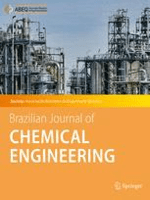
BRAZILIAN JOURNAL OF CHEMICAL ENGINEERING
Connecting Ideas, Inspiring InnovationsThe Brazilian Journal of Chemical Engineering (ISSN: 0104-6632, E-ISSN: 1678-4383), published by Springer Heidelberg, stands as a prominent open-access journal dedicated to disseminating innovative research and advancements in chemical engineering since its inception in 1997. With a commitment to enhancing knowledge exchange within the field, this journal is indexed in Scopus, earning a respectable Q3 rank in the category of General Chemical Engineering as of 2023. It provides a platform for researchers, professionals, and students to explore a diverse range of topics, fostering collaboration and innovation from its base in Brazil. The journal has converged its operations from 1995 and will continue to push the boundaries of chemical engineering research until 2024 and beyond. As a critical resource for up-to-date methodologies and emerging trends, the Brazilian Journal of Chemical Engineering is essential for those aiming to make impactful contributions in this dynamic and evolving field.

Journal of Industrial and Engineering Chemistry
Exploring Sustainable Solutions in Chemical EngineeringThe Journal of Industrial and Engineering Chemistry, published by Elsevier Science Inc, stands as a premier platform since its inception in 1996, dedicated to the dissemination of innovative research in the field of Chemical Engineering. Located in South Korea, this influential journal has established itself with an impressive impact factor and is categorized in the Q1 quartile for chemical engineering (miscellaneous), ranking in the top 12% of its category according to Scopus. With a focus on cutting-edge industrial applications, the journal covers a diverse range of topics including chemical processes, engineering innovations, and sustainable practices, appealing to a broad spectrum of researchers, professionals, and students. Although currently not open access, the journal offers a wealth of resources for advancing knowledge and driving forward the chemical engineering discipline. The converged years from 1996 to 2024 reflect its ongoing commitment to excellence and timeliness in publishing high-quality research.
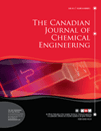
CANADIAN JOURNAL OF CHEMICAL ENGINEERING
Advancing the Frontiers of Chemical EngineeringCanadian Journal of Chemical Engineering, published by Wiley, stands as a pivotal platform in the field of chemical engineering, addressing a myriad of topics essential for researchers, professionals, and students alike. With ISSN 0008-4034 and E-ISSN 1939-019X, this journal has been a cornerstone of chemical engineering scholarship since its inception in 1958 and continues to provide valuable insights through its rigorous peer-reviewed articles. The journal is ranked in the Q2 category of the Scopus quartile rankings, reflecting its influence and relevance within the chemical engineering community, with a notable position of #137 out of 273 in the general chemical engineering field. Although it does not offer open access options, its comprehensive coverage of contemporary research and applications solidifies its status as a vital resource for advancing knowledge and innovation in chemical engineering.